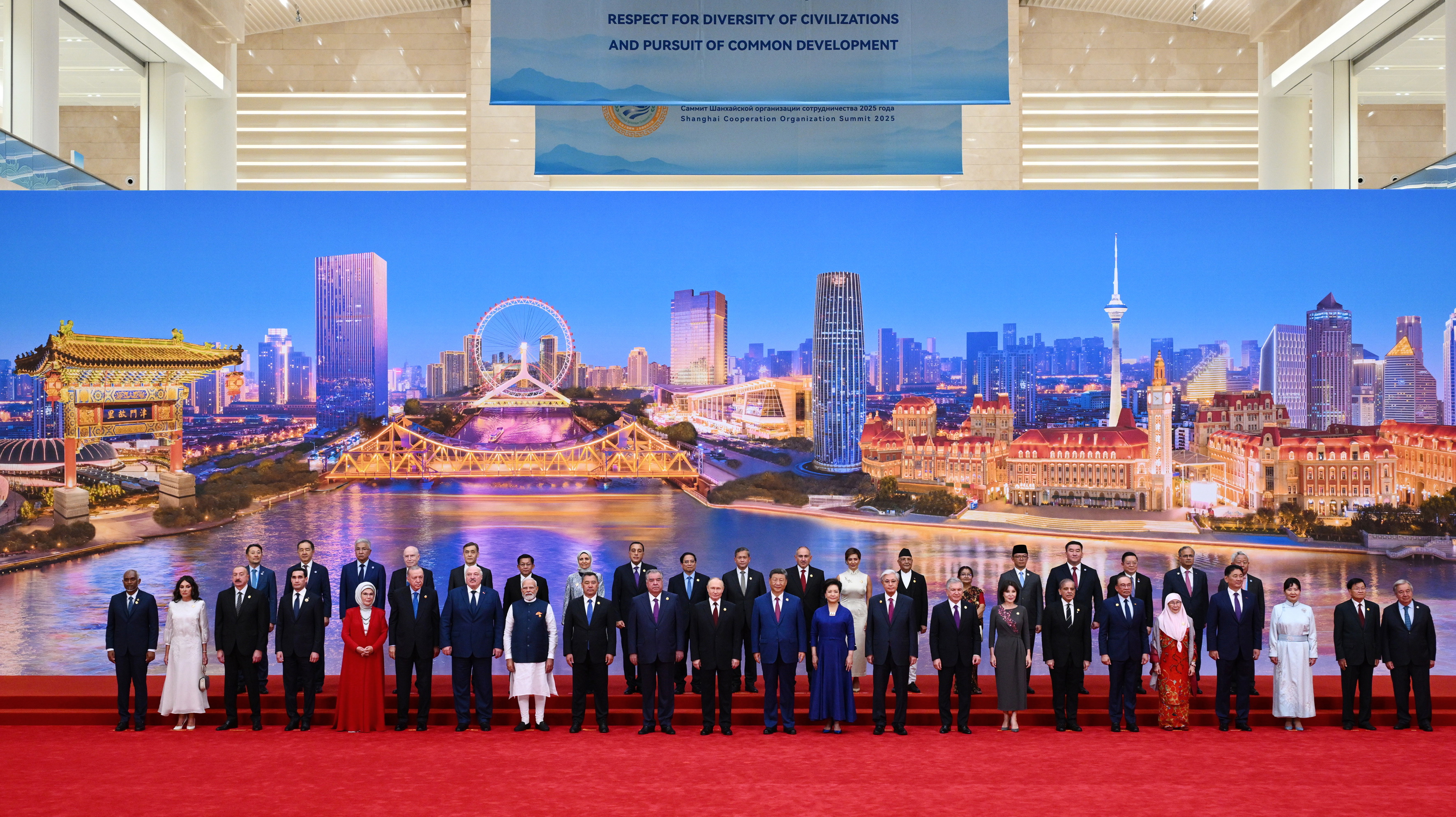Turbulence has overwhelmed the current international system and SCO member states are feeling a profound impact. The Tianjin Summit is designed to further deepen multilateral cooperation and to provide a new center for global strategic stability.

The Tianjin Summit 2025 represents a milestone since the founding of the Shanghai Cooperation Organization in 2001. In the face of global challenges — geopolitical conflicts, supply chain disruptions and governance deficits — the heads of state of its member countries not only need to enhance solidarity and mutual trust but also leverage the Tianjin Declaration to inject a degree of certainty into an uncertain world. This is the way to bring greater stability worldwide and transform the regional organization into a new global anchor.
The international order currently faces unprecedented challenges. As noted in the Global Risks Report 2025 published by the World Economic Forum, escalating geopolitical, environmental, social and technological challenges are undermining global stability and stalling progress. For example, the Geopolitical Risk with Trade (GPRT) index surged about 30 percent from 2020 to 2024 compared with the previous two decades. The Global Supply Chain Stress Index increased by 200 percent in the same period. Under the shadow of a widening peace deficit, geopolitical conflicts have inflicted economic losses amounting to trillions of dollars on the global economy.
The world’s turbulent landscape has overwhelmed the current international system, and the interplay of multiple challenges is making a profound impact on the shared destiny of SCO member states. Against this backdrop, the Tianjin Summit, which is designed to deepen multilateral cooperation, provides the Tianjin Consensus for global strategic stability and the building of a community with a shared future for humanity.
Multiple initiatives at work
Holding the current rotating presidency of SCO, China has organized more than 110 activities around the theme of sustainable development. Centered on security and cooperation in economics and infrastructure, these initiatives have laid a solid foundation for SCO to promote regional stability and sustainable development.
In the security field, member states remain committed to maintaining regional and global peace and stability. In meetings of the SCO Security Council secretaries and defense ministers, China has emphasized that the organization should evolve into a key force for maintaining regional and global peace by deepening multilateral cooperation. Building on the outcomes of the Tianjin Summit, the organization will accelerate the establishment of four security centers, including a universal center and its branches to address security challenges and threats, plus an anti-drug center. Through intelligence sharing, joint exercises and drug control cooperation, these centers promise to upgrade security mechanisms and enhance the capacity to safeguard regional and global peace and stability.
To enhance their ability to respond to global risks, the member states at the summit are also expected to accelerate the formulation of an implementation plan for the Strategy for Economic Development to 2030. The states have reached a consensus that unilateral sanctions violate international law and stand against protectionist measures that violate WTO rules. In fact, they have worked to promote local currency settlement and supply chain security, enhance customs supervision and ensure the continuity of trade and economic stability. According to World Bank statistics, their logistics performance has seen significant improvements and has yielded tangible positive outcomes. As of 2024, China’s trade with other member states had increased by 125 percent compared with 2017, when the organization underwent its first expansion.
Member states have laid a foundation for the resilience of regional supply chains through efficient cooperation on transportation infrastructure. Just days before the Tianjin Summit opened, their transport ministers signed a memorandum of understanding for the joint development of Silk Road stations designed to provide services in support of international shipping. Currently, the member states either operate, are constructing or are planning to build a total of 25 international transport corridors. These networks of roads and railways will not only provide safeguards against supply chain disruptions but also constitute strategic assets for enhancing the members’ collective bargaining power within global supply chains.
On the strategic issue of food security, SCO member states, as major global food producers and consumers, are fulfilling their international responsibilities by building cooperation mechanisms for food supply chains. For example, the SCO Demonstration Base for Agricultural Technology Exchange and Training in Yangling, Xi’an province, China, has established 11 agricultural technology demonstration parks across five member states. These parks deploy expert teams to promote high-quality crop varieties and efficient cultivation techniques. This initiative has significantly advanced regional agricultural modernization and provided a valuable model for global food security governance.
Roles of heads of state
The leadership role of heads of state is enshrined in the SCO Charter. Through the Council of Heads of State, they offer guidance on the organization’s development and foster results-oriented cooperation, particularly in advancing a community with a shared future for humanity and the Belt and Road Initiative. For example, the BRI has promoted trade growth through enhanced infrastructure connectivity. Between 2022 and 2024, trade between SCO member states increased by 30 percent to $1 trillion, while inbound investment exceeded $84 billion.
True to the Shanghai Spirit, the leaders set the tone for cross-sector cooperation and translate this spirit into concrete action as part of their collective efforts to address challenges. Their leadership in state-to-state diplomacy and this particular form of multilateral engagement not only challenge traditional hegemony-driven international relations but also support the Tianjin Consensus for a multipolar world order, calling for collective efforts to address global issues such as wealth disparity, climate change and food shortages in an inclusive manner.
This is the fifth time China has hosted the SCO Summit, and event that is expected to usher in the next golden decade for the organization, bringing certainty to an uncertain world and harnessing the strength of the organization to promote world peace and development.
